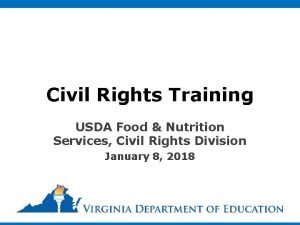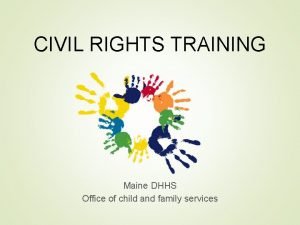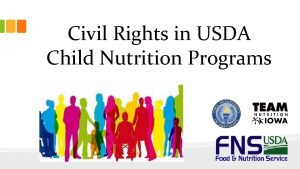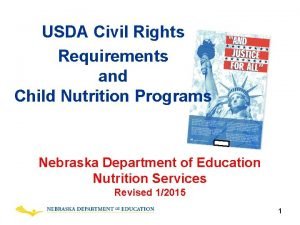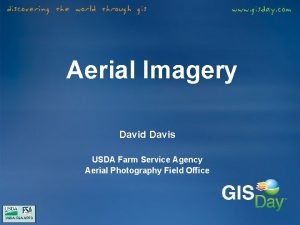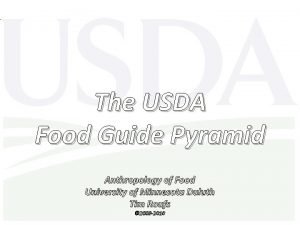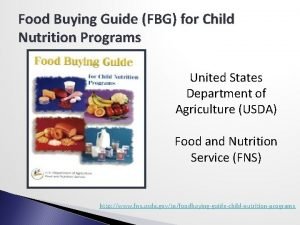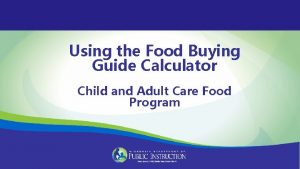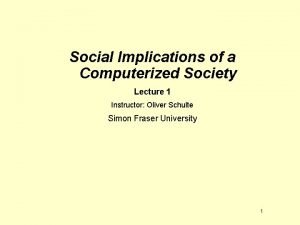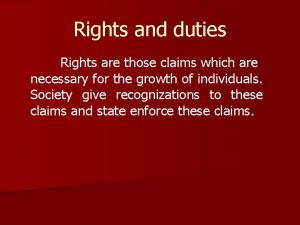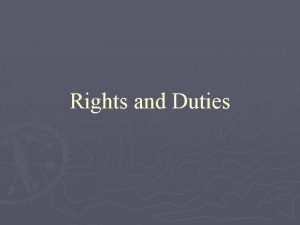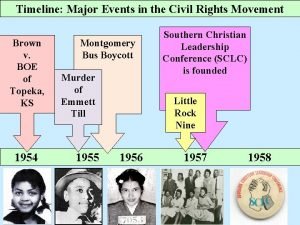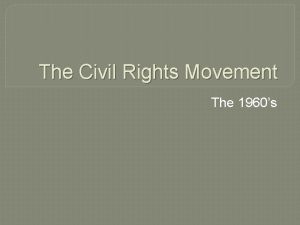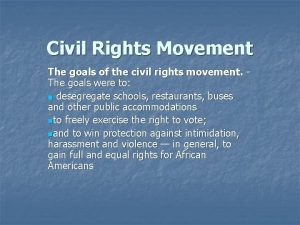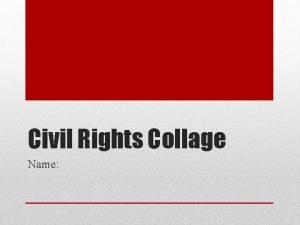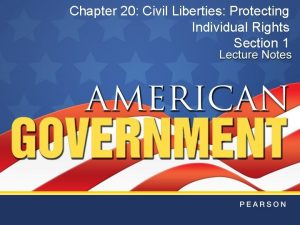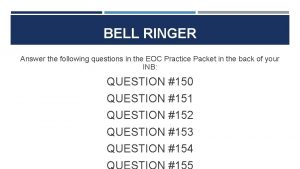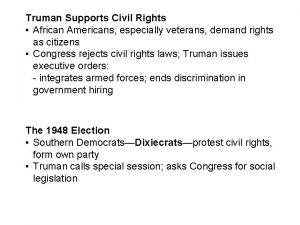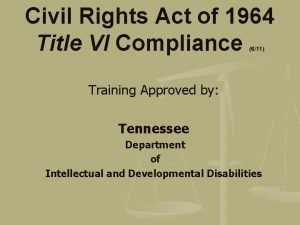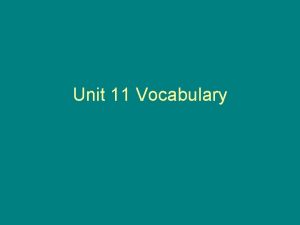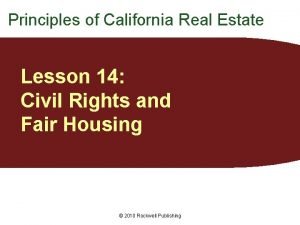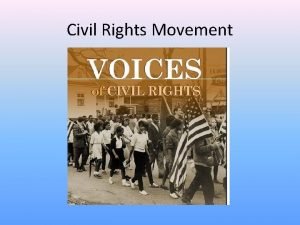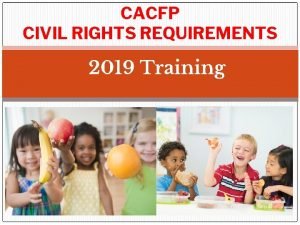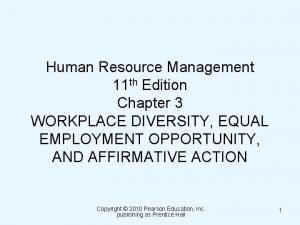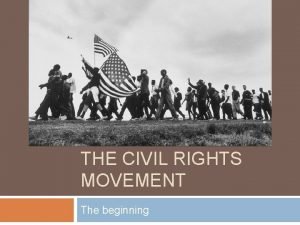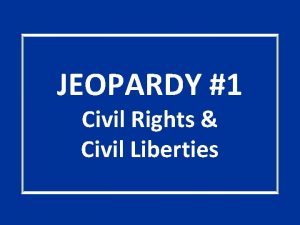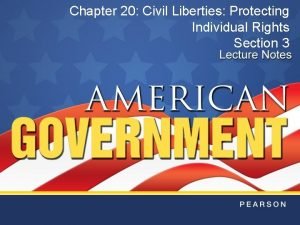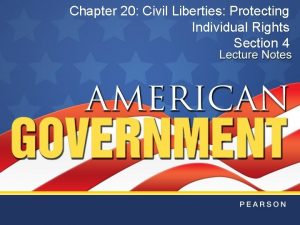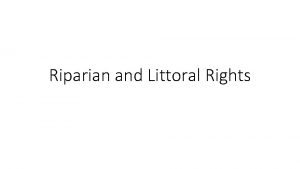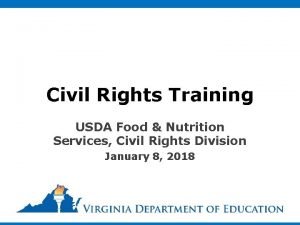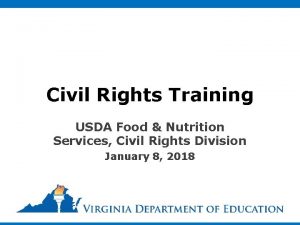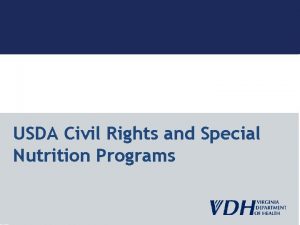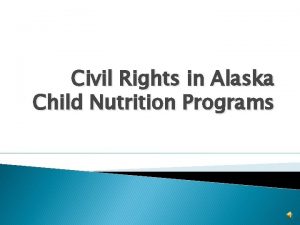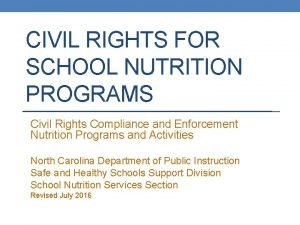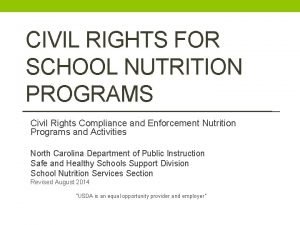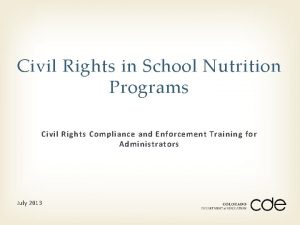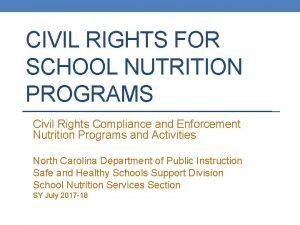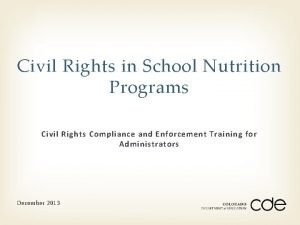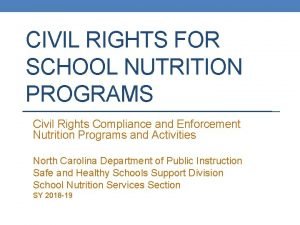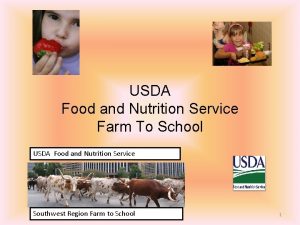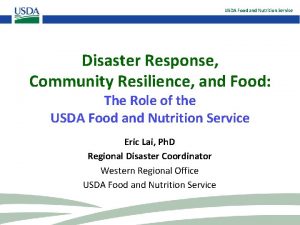Civil Rights Division Food and Nutrition Service USDA



















































- Slides: 51

Civil Rights Division Food and Nutrition Service, USDA March 24, 2017 1

Civil Rights Program and Legal Authorities Areas of Compliance • • • Assurances Public Notification Requirements Complaints of Discrimination Civil Rights Training Race and Ethnicity Data Collection Limited English Proficiency (LEP) Disability Compliance Reviews Resolution of Noncompliance Conflict Resolution Customer Service 2

Training is required so that individuals involved in all levels of administration of programs that receive Federal financial assistance understand Federal laws, regulations, instructions, policies and other guidance. 3

� Title VI of the Civil Rights Act of 1964 � Civil Rights Restoration Act of 1987 • Race, Color, and National Origin • Clarifies the scope of the Civil Rights Act of 1964 � Section 504 of the Rehabilitation Act of 1973 & Americans w/Disabilities Act of 1990 (ADA); ADA Amendments Act of 2008. • Disability 4

� Age • Discrimination Act of 1975 Age � Title • IX of the Education Amendments of 1972 Sex 5

� 7 CFR Part 16, Equal Opportunity for Religious Organizations � 7 CFR Parts 15, 15 a and 15 b - Nondiscrimination, Education, Disability � Executive Order 13166 – “Improving Access to Services for Persons with Limited English Proficiency" (August 11, 2000) � USDA LEP Policy Guidance (79 Fed. Reg. No. 229, Friday, November 28, 2014) 6

� 28 CFR Part 35: Nondiscrimination on the Basis of Disability in State/Local Government Services � 28 CFR Part 42: Nondiscrimination in Federally Assisted Programs � USDA Departmental Regulation 4330 -2 (nondiscrimination regulations) 7

� Richard 1946 � Child B. Russell National School Lunch Act of Nutrition Act of 1966 � 7 CFR Part 210: National School Lunch Program (NSLP) � 7 CFR Part 215: Special Milk Program for Children (SMP) 8

� 7 CFR Part 220: School Breakfast Program (SBP) � FNS Instruction 113 -1 and Appendix B (NSLP, SMP, and SBP) 9

� Richard of 1946 � Child � 7 B. Russell National School Lunch Act Nutrition Act of 1966 CFR Part 226 � FNS Instruction 113 -1 and Appendix B (CACFP) 10

� Richard of 1946 � Child � 7 B. Russell National School Lunch Act Nutrition Act of 1966 CFR Part 225 � FNS Instruction 113 -1 and Appendix B (SFSP) 11

� The Emergency Food Assistance Act of 1983 as amended � 7 CFR Parts 250 and 251 � FNS Instruction 113 -1 and Appendix C (TEFAP) 12

7 CFR Part 16 notes: �Ensures a level playing field for the participation of faith-based organizations and other community organizations in USDA programs. 13

Discrimination is different treatment which makes a distinction of one person or a group of persons from others; either intentionally, by neglect, or by the actions or lack of actions based on… 14

Six protected bases of Discrimination: 1)Race 2)Color 3)National Origin 4)Age 5)Sex 6)Disability 15

� To qualify for Federal financial assistance, the program application must be accompanied by a written assurance that the program or facility will be operated in compliance with the Civil Rights laws and implementing nondiscrimination regulations. �A civil rights assurance must be incorporated in all agreements between State and local agencies and their subrecipients � See FNS Instruction 113 -1, Appendices B and C for Program-specific assurance language. 16

Subrecipient agreements must also include a Civil Rights assurance of nondiscrimination. Many SFAs contract with Food Service Management Companies (FSMC) to provide food service to students. Thus, the SFA would be responsible for ensuring that their FSMCs are in compliance with CR requirements. These assurances are binding on the program applicant and its successors, transferees, and assignees, as long as they receive assistance or retain possession of any assistance from USDA. 17

All FNS assistance programs must include a public notification system. 18

Program Availability Inform applicants, participants, and potentially eligible persons of their program rights and responsibilities and the steps necessary for participation. Complaint Information Advise applicants and participants at the service delivery point of their right to file a complaint, how to file a complaint, and the complaint procedures. 19

� Nondiscrimination Statement All information materials and sources, including Web sites, used by FNS, State agencies, local agencies, or other subrecipients to inform the public about FNS programs must contain a nondiscrimination statement. The statement is not required to be included on every page of the program Web site. At a minimum, the nondiscrimination statement or a link to it must be included on the home page of the program information. 20

State agencies and their subrecipients must: Make program information available to the public upon request; Prominently display the “And Justice for All” poster; Inform potentially eligible persons, applicants, participants and grassroots organizations of programs or changes in programs; Convey the message of equal opportunity in all photos and other graphics that are used to provide program or programrelated information; Provide appropriate information in alternative formats for persons with disabilities and in the appropriate language(s) for LEP persons. 21

In accordance with Federal civil rights law and U. S. Department of Agriculture (USDA) civil rights regulations and policies, the USDA, its Agencies, offices, and employees, and institutions participating in or administering USDA programs are prohibited from discriminating based on race, color, national origin, sex, disability, age, or reprisal or retaliation for prior civil rights activity in any program or activity conducted or funded by USDA. Persons with disabilities who require alternative means of communication for program information (e. g. Braille, large print, audiotape, American Sign Language, etc. ), should contact the Agency (State or local) where they applied for benefits. Individuals who are deaf, hard of hearing or have speech disabilities may contact USDA through the Federal Relay Service at (800) 877 -8339. Additionally, program information may be made available in languages other than English. To file a program complaint of discrimination, complete the USDA Program Discrimination Complaint Form, (AD-3027) found online at: http: //www. ascr. usda. gov/complaint_filing_cust. html, and at any USDA office, or write a letter addressed to USDA and provide in the letter all of the information requested in the form. To request a copy of the complaint form, call (866) 632 -9992. Submit your completed form or letter to USDA by: (1) mail: U. S. Department of Agriculture Office of the Assistant Secretary for Civil Rights 1400 Independence Avenue, SW Washington, D. C. 20250 -9410; (2) fax: (202) 690 -7442; or (3) email: program. intake@usda. gov. This institution is an equal opportunity provider. 22

De conformidad con la Ley Federal de Derechos Civiles y los reglamentos y políticas de derechos civiles del Departamento de Agricultura de los EE. UU. (USDA, por sus siglas en inglés), se prohíbe que el USDA, sus agencias, oficinas, empleados e instituciones que participan o administran programas del USDA discriminen sobre la base de raza, color, nacionalidad, sexo, discapacidad, edad, o en represalia o venganza por actividades previas de derechos civiles en algún programa o actividad realizados o financiados por el USDA. Las personas con discapacidades que necesiten medios alternativos para la comunicación de la información del programa (por ejemplo, sistema Braille, letras grandes, cintas de audio, lenguaje de señas americano, etc. ), deben ponerse en contacto con la agencia (estatal o local) en la que solicitaron los beneficios. Las personas sordas, con dificultades de audición o discapacidades del habla pueden comunicarse con el USDA por medio del Federal Relay Service [Servicio Federal de Retransmisión] al (800) 877 -8339. Además, la información del programa se puede proporcionar en otros idiomas. Para presentar una denuncia de discriminación, complete el Formulario de Denuncia de Discriminación del Programa del USDA, (AD-3027) que está disponible en línea en: http: //www. ascr. usda. gov/complaint_filing_cust. html y en cualquier oficina del USDA, o bien escriba una carta dirigida al USDA e incluya en la carta toda la información solicitada en el formulario. Para solicitar una copia del formulario de denuncia, llame al (866) 632 -9992. Haga llegar su formulario lleno o carta al USDA por: (1) correo: U. S. Department of Agriculture Office of the Assistant Secretary for Civil Rights 1400 Independence Avenue, SW Washington, D. C. 20250 -9410; (2) fax: (202) 690 -7442; o (3) correo electrónico: program. intake@usda. gov. Esta institución es un proveedor que ofrece igualdad de oportunidades. 23

At a minimum, the Nondiscrimination Statement should be on: Application Form(s) Notification of Eligibility or Ineligibility Notice of Adverse Action Form Program (Home) Web Page Public Information, including program literature 24

�USDA Nondiscrimination Statement (NDS) ◦ Short version �This institution is an equal opportunity provider. �Esta institución es un proveedor que ofrece igualdad de oportunidades. (Spanish) �*Can be used in special circumstances only ◦ Translations �Other languages are forthcoming 25

� Display the poster in a prominent location for all to view � AD-475 A ◦ New required version. 26

� Complaints shall be accepted and forwarded to USDA; � Complaints must be filed within 180 days from the alleged act of discrimination; � Complaints � � may be written, verbal, or anonymous; State agencies or subrecipient agencies may develop their own complaint forms, but the use of such forms cannot be a pre-requisite for acceptance ; A separate Civil Rights complaint log shall be maintained by the State & subrecipient agency; � Confidentiality maintained. is extremely important and must be 27

Complaints should include: � Name, address, and telephone number of the complainant � The location and name of the organization or office � The nature of the incident or action � � � The names, titles, and business addresses of persons who may have knowledge of the discriminatory action The date(s) during which the alleged discriminatory actions occurred The basis for the alleged discrimination. 28

�USDA Discrimination Complaint Form ◦ English http: //www. ocio. usda. gov/sites/default/files/docs/2012/Co mplain_combined_6_8_12. pdf ◦ Spanish http: //www. ocio. usda. gov/sites/default/files/docs/2012/Sp anish_Form_508_Compliant_6_8_12_0. pdf 29

State agencies are responsible for training subrecipient agencies on an annual basis. Subrecipient agencies and CACFP sponsors are responsible for training their local sites, including “frontline staff” who interact with applicants or participants on an annual basis. New employees before participating in Program activities Volunteers must receive training appropriate to their roles and responsibilities 30

All staff should receive training on all aspects of Civil Rights compliance, including: Collection and use of data; Effective public notification systems; Complaint procedures; Compliance review techniques; Resolution of noncompliance; Requirements for reasonable accommodation of persons with disabilities; Requirements for language assistance; Conflict resolution; and Customer service. 31

Purpose: To determine how effectively FNS programs are reaching potentially eligible persons and beneficiaries As a means of monitoring Civil Rights compliance, state agencies shall establish a system for the collection of racial/ethnic data of each person applying for and receiving benefits. 32

Applicants shall be assured that the information is required for and used for statistical purposes only and has no effect on eligibility criteria. Data should be collected at the point of application and retained at the service delivery area. 33

CACFP State agencies and sponsors should compare their participant data with potentially eligible persons within their service areas. - If disparities or areas of underrepresentation occur, it will be necessary to investigate the causes for it; - Provide additional outreach as needed; - Assist with selection of compliance reviews. 34

Two Question Format 1. Ethnicity (must select one of the following) • • Hispanic or Latino Not Hispanic or Latino 2. Race (one or more of the following) • • • American Indian or Alaskan Native Asian Black or African American Native Hawaiian or Other Pacific Islander White 35

Definition Individuals who do not speak English as their primary language and who have a limited ability to read, speak, write, or understand English. 36

Title VI and its implementing regulations, Executive Order 13166, and USDA LEP Guidance require Federal agencies and recipients (State agencies, local agencies, or other subrecipients), to take reasonable steps to ensure “meaningful” access to their programs and activities by Limited English Proficient (LEP) persons. (FNS Instruction 113 -1, Section VII) 37

Factors to consider in addressing LEP: Number or proportion of LEP persons served or encountered in the eligible population. Frequency with which LEP individuals come in contact with the program. Nature and importance of the program, activity, or service provided by the program. Resources available to the recipient and costs. 38

States must conduct assessments to determine language profile for their State, taking into account regional differences and updating as appropriate. Translation of vital documents is required. Oral translations and interpretation services are also required. Staff training regarding how to provide LEP populations with meaningful access is paramount (front line, staff). 39

Population data sources Interagency LEP Website – Mapping Tool http: //www. lep. gov/maps/ US Census Data American Community Survey Migration Policy Institute’s National Center on Immigrant Integration Policy http: //www. census. gov/2010 census/data/ http: //www. census. gov/acs/ http: //www. migrationpolicy. org/ 40

� Sections 504 of the Rehabilitation Act of 1973 and USDA implementing Regulation, 7 CFR Part 15 b • prohibits discrimination based on disability in programs or activities receiving Federal financial assistance. � Americans with Disabilities Act (ADA), 28 CFR Part 35, Title II, Subtitle A • prohibits discrimination on the basis of disability in all services, programs and activities provided to the public by State and local governments. � These Civil Rights laws protect persons with disabilities if they are potential applicants or participants in any FNS funded programs. 41

What is the definition of disability? � A person who has a physical or mental impairment which substantially limits one or more major life activities, has a record of such an impairment, or is regarded as having such an impairment. � Major life activity means functions such as caring for one’s self, performing manual tasks, walking, seeing, hearing, speaking, breathing, learning and working. *functions of the immune system, normal cell growth, digestive, bowel, bladder, neurological, brain, respiratory, circulatory, cardiovascular, endocrine, and reproductive functions. (ADA Amendments Act of 2008) 42

� The ADA requires public entities to make “reasonable modifications” in their usual ways of doing things when necessary to accommodate people who have disabilities. (e. g. provide Braille, large print, audio tape, other auxiliary aids or services). � Providing qualified sign language interpreters for persons with hearing disabilities may be necessary to effectively communicate with these applicants and participants. 43

Examine the activities of State agencies, CACFP sponsors, subrecipients and local sites to determine Civil Rights compliance; FNS Civil Rights and Program staffs review State agencies. • FNS staff and State agencies review subrecipients and CACFP sponsors. Subrecipients review local sites. CACFP sponsors review their sub recipients. Significant findings must be provided in writing to the reviewed entity and to FNS. 44

There are three types of compliance reviews: Pre-Award Compliance Reviews Routine (Post-Award) Compliance Reviews Special Compliance Reviews 45

State agencies, CACFP sponsors, or other sub recipients must be in compliance with Civil Rights requirements prior to approval for Federal financial assistance. (FNS Instruction 113 -1, Appendix B and C) 46

FNS and State agency must conduct routine compliance reviews as identified by FNS Instruction 113 -1 and program-specific regulations, policies Sample post-award review questions Do printed materials contain the nondiscrimination statement? Is the And Justice For All poster displayed appropriately? Are program informational materials available to all? Is data on race and ethnicity collected appropriately? How are applicants and participants advised of their right to file a Civil Rights complaint of discrimination? Are reasonable modifications appropriately made for people with disabilities? 47

May be scheduled or unscheduled; To follow-up on previous findings of noncompliance; To investigate reports of noncompliance by other agencies, media, or grassroots organizations; May be specific to an incident or policy; History of statistical underrepresentation of particular group(s); Pattern of complaints of discrimination. 48

A factual finding that any civil rights requirement, as provided by law, regulation, policy, instruction, or guidelines, is not being adhered to by a State agency, subrecipient agency, or a local site. Steps must be taken immediately to obtain voluntary compliance. A finding’s effective date is the date of notice to the reviewed entity. 49

Questions? 50

� For more information contact: Gail A. Hoffman Regional Civil Rights Director Southeast Regional Office Food and Nutrition Service 61 Forsyth Street, SW Room 8 T 36 Atlanta, GA 30303 Gail. Hoffman@fns. usda. gov (404) 562 -7033 51
 Usda food and nutrition service
Usda food and nutrition service Usda civil rights training
Usda civil rights training Civil rights webquest
Civil rights webquest Civil rights training child nutrition programs
Civil rights training child nutrition programs Civil rights in child nutrition programs
Civil rights in child nutrition programs Civil rights in child nutrition programs
Civil rights in child nutrition programs Montgomery bus boycott apush
Montgomery bus boycott apush Unit 7: modern ga and civil rights
Unit 7: modern ga and civil rights Chapter 14 postwar prosperity and civil rights
Chapter 14 postwar prosperity and civil rights Usda farm service agency maps
Usda farm service agency maps Food guide pyramid 1992
Food guide pyramid 1992 Baby food buying guide
Baby food buying guide Usda food pyramid 1970
Usda food pyramid 1970 Usda food defense self assessment checklist
Usda food defense self assessment checklist Food buying guide calculator app
Food buying guide calculator app Lausd food services
Lausd food services Negative rights vs positive rights
Negative rights vs positive rights Moral duties
Moral duties Legal rights and moral rights
Legal rights and moral rights Negative right
Negative right Civil rights timeline of events
Civil rights timeline of events Civil rights sitins
Civil rights sitins Rosa parks mother
Rosa parks mother Right to die
Right to die Civil rights movement jeopardy
Civil rights movement jeopardy Civil rights movement goal
Civil rights movement goal Civil rights graphic organizer
Civil rights graphic organizer Civil rights collage
Civil rights collage Civil rights choice board
Civil rights choice board Chapter 21 civil rights equal justice under law
Chapter 21 civil rights equal justice under law Chapter 20 civil liberties protecting individual rights
Chapter 20 civil liberties protecting individual rights Civil rights bell ringers
Civil rights bell ringers Truman supports civil rights
Truman supports civil rights Characteristics of civil rights
Characteristics of civil rights Civil rights cloze notes 1
Civil rights cloze notes 1 Brain wrinkles social studies answer key
Brain wrinkles social studies answer key Civil rights training quiz answers
Civil rights training quiz answers Title vi of the civil rights act of 1964
Title vi of the civil rights act of 1964 Civil rights movement vocabulary
Civil rights movement vocabulary Unruh civil rights act real estate
Unruh civil rights act real estate Civil rights movement webquest
Civil rights movement webquest Civil rights movment
Civil rights movment Cacfp civil rights
Cacfp civil rights Title vii of the civil rights act
Title vii of the civil rights act Title vii of the civil rights act
Title vii of the civil rights act The civil rights movement
The civil rights movement Civil rights jeopardy
Civil rights jeopardy Civil rights movement essential questions
Civil rights movement essential questions What did sncc accomplish and how
What did sncc accomplish and how Chapter 20 civil liberties protecting individual rights
Chapter 20 civil liberties protecting individual rights Chapter 20 civil liberties protecting individual rights
Chapter 20 civil liberties protecting individual rights Littoral right
Littoral right

